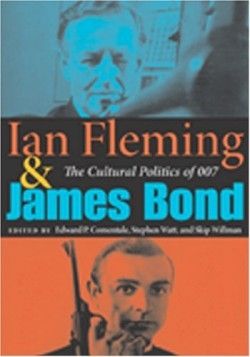Ian Fleming & James Bond
The Cultural Politics of 007
For those who recall the paranoia, the unyielding sense of foreboding, and the daily threat of nuclear annihilation that defined life during Cold War, there was no greater fictional antidote than Ian Fleming’s James Bond. While the film franchise keeps cranking out product, and descendants such as 24’s Jack Bauer carry on the tradition of ruthless patriotism exemplified by 007, the influence of Bond went far beyond a few hours of mindless page turning or film viewing. John F. Kennedy listed From Russia with Love as one of his ten favorite books, and an anecdote in this new book reports Kennedy probing Fleming at a dinner party for suggestions of how to topple Fidel Castro.
This collection of essays, delivered at Indiana University in 2003 at a symposium organized to celebrate the fiftieth anniversary of James Bond’s appearance in Casino Royale, features the work of international scholars in fields including literature, history, gender studies, modern culture, and communications. Far from the staid proceedings that one might imagine at such a gathering, some of the papers were so controversial that the concluding keynote speaker felt compelled to upbraid the theoretical approaches of certain presenters, leading to a manifesto and a later roundtable discussion led by the scolding speaker, and eventually a boycott of those called to task.
The fourteen essays, with titles such as “James Bond, Cyborg-Aristocrat” and “Lesbian Bondage, or Why Dykes Like 007,” present a lively and provocative examination of this mid-twentieth century icon’s role as a reflection of the era’s charged political transitions, changing gender roles, and mercurial economic outlook. As James Chapman states in his essay, “The cultural politics of national identity have long been recognized as a factor in the popularity of James Bond” and the character represents “the code of nationhood, imperialism, class and masculinity.” Brian Patton’s depiction of Bond “as a quintessentially English figure” allows the work to illustrate the atmosphere of apprehension, as well as the recognition of the British Empire’s steady slide into decline as displayed in the cold-blooded decadence and treachery of the novels.
The three editors, (who are members of the English departments of Indiana University and the University of South Dakota) and the various contributors take Fleming’s work out of the closet of guilty pleasures to reveal a literary creation that provides a fascinating portrait of the social and cultural landscape of a volatile period in the recent past.
Reviewed by
Dan Bogey
Disclosure: This article is not an endorsement, but a review. The publisher of this book provided free copies of the book to have their book reviewed by a professional reviewer. No fee was paid by the publisher for this review. Foreword Reviews only recommends books that we love. Foreword Magazine, Inc. is disclosing this in accordance with the Federal Trade Commission’s 16 CFR, Part 255.

